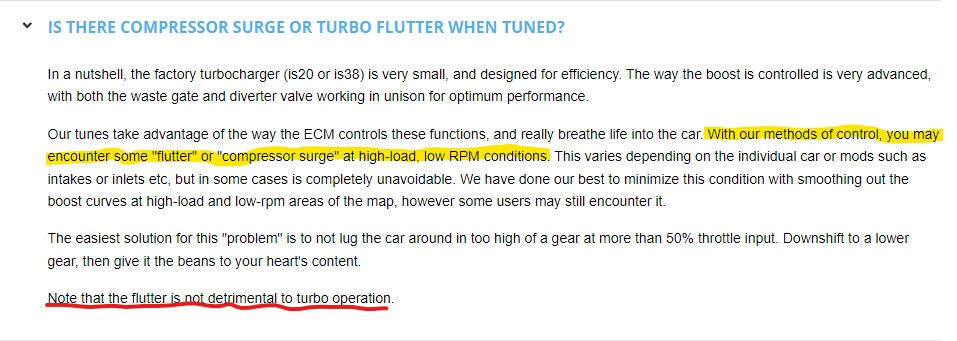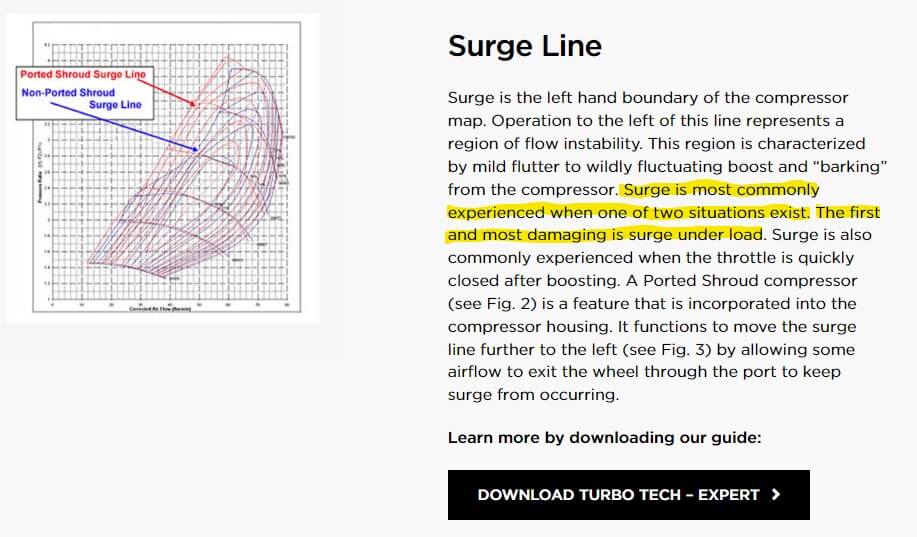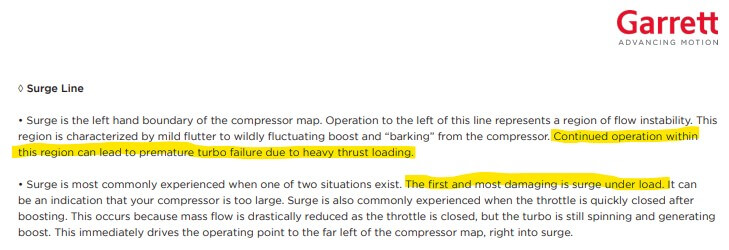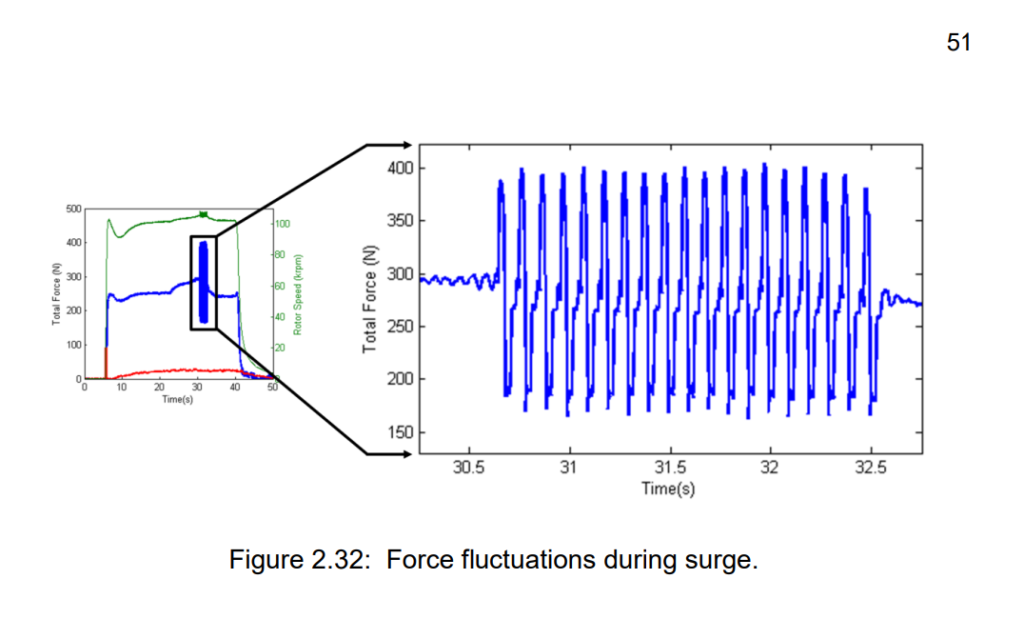Background:
Recently a question was posed by someone asking about a fluttering sound they were hearing from their GTI and if the sound was something to be concerned about.
Among the responses was one made by Equilibrium Tuning providing a link to the company’s Frequently Asked Questions and their opinion on compressor surge.

Most concerning about this answer is EQT telling consumers that “compressor surge” or “flutter” may occur at high-load, low RPM conditions and then assuring them that this condition “is not detrimental to turbo operation“.
Topic – Compressor Surge:
Here’s what Garrett Turbochargers has to say about compressor surge under load.


Another source of information is Nicholas C. Baines Fundamentals of Turbocharging (pg. 54):

Recommendation:
I thought that EQT had not adequately proofread the FAQ and would want to be more clear about “on-throttle” compressor surge and “off-throttle” compressor surge, similar to how Garrett has made clear that there are two distinct types of compressor surge.
Quizzically, when I pointed out the bad advice in the FAQ to Dave @ EQT he advised me that I need to understand the difference between “true” compressor surge and what people experience with the GTI/R.
Note: Regardless of whether the surge occurs during on-throttle or off-throttle operation it is surge. See Garrett’s explanations above.
Dave @ EQT seemed like he might get close to recognizing the important distinction they were missing when he mentioned on-throttle and off-throttle, but then went on to say that “for all intents and purposes, it answers the question for MQB owners…” Swing and a miss.
Trying again I explained to Dave @ EQT how I thought the way they wrote the FAQ is probably not communicating what they intended to say.
- “long story short Jeff”
- “don’t worry about it”
- “absolutely normal“
- “moving right on along“

Conclusions:
Stick with the information provided by Garrett Turbochargers and ignore what Equilibrium Tuning is saying on the topic of compressor surge.
Be cautious about assuming parts shops and tuners are credible sources of information when no evidence is provided.
Supplemental information:
Here’s a good example of the change of loading on the turbocharger bearing system during compressor surge.
The condition of surge was investigated to determine its effects on the axial forces. Additional back pressure was added to the turbocharger compressor until the boundary on the compressor map was crossed therefore entering surge. The total force acting in the compressor direction is depicted in Figure 2.32.
Dynamic Performance of Turbocharger Rotor-Bearing System

Extreme force fluctuations were caused by the reversal in air flow and produced an audible beating noise. The amplitude of fluctuation was 100 N from the mean. Surge should be avoided during engine operation as the forces can damage the bearing system with the potential of failure to occur.
Dynamic Performance of Turbocharger Rotor-Bearing System
Reference: Brouwer, M. (2015). Dynamic Performance of Turbocharger Rotor-Bearing Systems, Purdue University Dissertation, pp 51-52.
Here’s another mention of the problems with compressor surge under load from High Performance Academy.
Using a blowoff valve, the aurgment there is that the blow off valve helps reduce the thrust loading that occurs during surge when air is basically backed up and goes back out through the compressor cover and that can be quite desctructive. Particularly if we actually run a compressor wheel into surge which is off to the left hand side of the surge line under wide open throttle or full power operation, because of the higher loading that occurs at that point, that can very quickly do a lot of serious damage to your turbocharger…
High Performance Academy
This discussion starts around 13:00 of the video.


I think I have a similar problem on my Audi with Revo STG1 tune and stock IS20. From the TuneZilla graph, you can see that at around 3K RPM there is a dip and then a rise in engine torque. I can feel it really well on my bu*t dyno at WOT. The sound coming from this it’s like the wastegate is opening and closing very fast for around three times. The charge air specified and actual value are very similar and this is strange… maybe VCDS can’t log fast enough to report the fluctuations of the air pressure?
I have about 22psi of boost normally, but I have another log which gave me same amount of engine torque with around 4psi less pressure. Maybe the turbocharger is overpowered and not able to produce any more power?
https://log.tunezilla.com/assets/log/589175/image/3EhGDZPrg6celkgIEJJE7jyh
I suspect VCDS does not sample fast enough to show the pressure fluctuations.
Absolute roast of dave backed by facts. Love it.